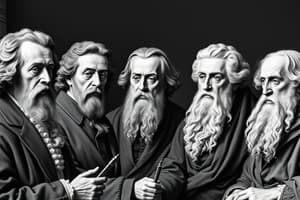Podcast
Questions and Answers
Match the philosopher with their main work:
Match the philosopher with their main work:
Thomas Hobbes = Leviathan John Locke = Two Treatises of Government Montesquieu = The Spirit of Laws Voltaire = Candide
Match the thinker with their belief about human nature:
Match the thinker with their belief about human nature:
Hobbes = Nasty, brutish, and short Locke = Blank slate (tabula rasa) Montesquieu = Checks on power Voltaire = Advocacy of civil liberties
Match the concept with the philosopher who promoted it:
Match the concept with the philosopher who promoted it:
Social contract = Hobbes Natural rights = Locke Separation of powers = Montesquieu Satire of society = Voltaire
Match the statement with the correct philosopher:
Match the statement with the correct philosopher:
Match the following terms with their definitions:
Match the following terms with their definitions:
Match the American thinkers with their contributions:
Match the American thinkers with their contributions:
Match the individual with their nationality:
Match the individual with their nationality:
Match the ideas with their corresponding era:
Match the ideas with their corresponding era:
Match the Enlightenment thinkers with their contributions:
Match the Enlightenment thinkers with their contributions:
Match the ideas with their definitions during the Enlightenment:
Match the ideas with their definitions during the Enlightenment:
Match the revolutions with their goals:
Match the revolutions with their goals:
Match the 'isms' with their characteristics:
Match the 'isms' with their characteristics:
Match the historical events with their triggers:
Match the historical events with their triggers:
Match the terms with their related concepts:
Match the terms with their related concepts:
Match the key concepts with their effects on society:
Match the key concepts with their effects on society:
Match the Enlightenment ideas with their proponents:
Match the Enlightenment ideas with their proponents:
Match the following Enlightenment thinkers with their contributions:
Match the following Enlightenment thinkers with their contributions:
Match the following works to their respective authors:
Match the following works to their respective authors:
Match the following philosophies with their descriptions:
Match the following philosophies with their descriptions:
Match the following concepts with the thinkers who promoted them:
Match the following concepts with the thinkers who promoted them:
Match the following historical figures with their context of influence:
Match the following historical figures with their context of influence:
Match the following theories to their associated movements:
Match the following theories to their associated movements:
Match the following events with the ideas they influenced:
Match the following events with the ideas they influenced:
Match the following terms with their meanings:
Match the following terms with their meanings:
Match the following Deist beliefs with their descriptions:
Match the following Deist beliefs with their descriptions:
Match the historical periods with their representative thinkers:
Match the historical periods with their representative thinkers:
Match the key characteristics with their corresponding thinkers from the Enlightenment:
Match the key characteristics with their corresponding thinkers from the Enlightenment:
Match the proposed solutions to urban issues with the perspectives of different groups:
Match the proposed solutions to urban issues with the perspectives of different groups:
Match the characteristics of Renaissance Humanism with their descriptions:
Match the characteristics of Renaissance Humanism with their descriptions:
Match the Enlightenment thinkers with their beliefs:
Match the Enlightenment thinkers with their beliefs:
Match the terms with their definitions related to conservatism:
Match the terms with their definitions related to conservatism:
Match the thinkers with their contributions to the Enlightenment movement:
Match the thinkers with their contributions to the Enlightenment movement:
Match the following events with their corresponding dates:
Match the following events with their corresponding dates:
Match the following influential figures with their ideas:
Match the following influential figures with their ideas:
Match the following feminist figures with their contributions:
Match the following feminist figures with their contributions:
Match the following economic theories with their proponents:
Match the following economic theories with their proponents:
Match the following themes with their related terms:
Match the following themes with their related terms:
Match the following events with their significance in the women's rights movement:
Match the following events with their significance in the women's rights movement:
Match the following abolitionist milestones with their descriptions:
Match the following abolitionist milestones with their descriptions:
Match the following movements with their descriptions:
Match the following movements with their descriptions:
Match the following terms related to slavery with their definitions:
Match the following terms related to slavery with their definitions:
Match the following notable events with their causes:
Match the following notable events with their causes:
Match the following concepts with their related ideas:
Match the following concepts with their related ideas:
Match the following publications with their authors:
Match the following publications with their authors:
Match the following years with key events in the women's rights timeline:
Match the following years with key events in the women's rights timeline:
Match the following abolitionist strategies with their descriptions:
Match the following abolitionist strategies with their descriptions:
Match the following countries with their actions regarding slavery:
Match the following countries with their actions regarding slavery:
Flashcards
The Enlightenment
The Enlightenment
A period of intellectual and cultural change in the 17th and 18th centuries that emphasized reason, individualism, and human progress.
Empiricism
Empiricism
The belief that knowledge comes from sensory experiences and observations, rather than solely from tradition or authority.
Liberalism
Liberalism
A political philosophy that emphasizes individual rights, liberty, and limited government.
Socialism
Socialism
Signup and view all the flashcards
Conservatism
Conservatism
Signup and view all the flashcards
Nationalism
Nationalism
Signup and view all the flashcards
Constitutional representation
Constitutional representation
Signup and view all the flashcards
Break-up of empires
Break-up of empires
Signup and view all the flashcards
Social Contract
Social Contract
Signup and view all the flashcards
Tabula Rasa
Tabula Rasa
Signup and view all the flashcards
Philosophes
Philosophes
Signup and view all the flashcards
Separation of Powers
Separation of Powers
Signup and view all the flashcards
Right to Revolt
Right to Revolt
Signup and view all the flashcards
State of Nature
State of Nature
Signup and view all the flashcards
Natural Rights
Natural Rights
Signup and view all the flashcards
Checks and Balances
Checks and Balances
Signup and view all the flashcards
Feminism
Feminism
Signup and view all the flashcards
Declaration of the Rights of Woman and the Female Citizen
Declaration of the Rights of Woman and the Female Citizen
Signup and view all the flashcards
A Vindication of the Rights of Women
A Vindication of the Rights of Women
Signup and view all the flashcards
Women's Rights Movement
Women's Rights Movement
Signup and view all the flashcards
Abolitionism
Abolitionism
Signup and view all the flashcards
Slavery
Slavery
Signup and view all the flashcards
Slave Trade
Slave Trade
Signup and view all the flashcards
Abolition
Abolition
Signup and view all the flashcards
Who was Voltaire?
Who was Voltaire?
Signup and view all the flashcards
What is the social contract?
What is the social contract?
Signup and view all the flashcards
What is the 'General Will' according to Rousseau?
What is the 'General Will' according to Rousseau?
Signup and view all the flashcards
Who was Adam Smith?
Who was Adam Smith?
Signup and view all the flashcards
What is the 'invisible hand'?
What is the 'invisible hand'?
Signup and view all the flashcards
What does 'laissez-faire' mean?
What does 'laissez-faire' mean?
Signup and view all the flashcards
What is Deism?
What is Deism?
Signup and view all the flashcards
What is mercantilism?
What is mercantilism?
Signup and view all the flashcards
Zionism
Zionism
Signup and view all the flashcards
Pogrom
Pogrom
Signup and view all the flashcards
Theodor Herzl
Theodor Herzl
Signup and view all the flashcards
Dreyfus Affair
Dreyfus Affair
Signup and view all the flashcards
Zionism
Zionism
Signup and view all the flashcards
Zionism
Zionism
Signup and view all the flashcards
Zionism
Zionism
Signup and view all the flashcards
Zionism
Zionism
Signup and view all the flashcards
Deism
Deism
Signup and view all the flashcards
Enlightenment
Enlightenment
Signup and view all the flashcards
Scientific Method
Scientific Method
Signup and view all the flashcards
Human Perfectibility
Human Perfectibility
Signup and view all the flashcards
Urbanization and Industrialization
Urbanization and Industrialization
Signup and view all the flashcards
Poverty in the cities
Poverty in the cities
Signup and view all the flashcards
Study Notes
The Enlightenment
- The Enlightenment emphasized reason over tradition and individualism over community values.
- Key figures during this period included Descartes, who emphasized the importance of individual thought.
- The movement challenged the roles of monarchs and the church, influencing revolutions in the US, France, and elsewhere.
- Enlightenment thinkers were optimistic about human progress, believing reason applied to natural laws would lead to advancement.
- They emphasized human capabilities to understand the natural world, although they did not deny the existence of God.
- Traditional religious views became less pervasive during this period.
- New ideas like liberalism and socialism emerged, alongside conservatism, which opposed these ideas.
- The Enlightenment also led to revolutions with the aims of independence and constitutional representation.
- Nationalism—the feeling of loyalty to one's culture and language group—became a significant idea during this period.
- This concept contributed to the desire for independent nation-states, challenging existing multiethnic empires.
Roots of New Ideas
- Francis Bacon emphasized empirical methods of scientific inquiry, meaning knowledge derived from experience and experiments, not just reasoning.
- Thomas Hobbes and John Locke viewed political life through a social contract lens.
- Hobbes believed people's natural state was bleak and required a strong central government for order.
- Locke argued for natural rights to life, liberty, and property and the right to revolt against unjust government.
- Locke's idea of the "blank slate" (tabula rasa) emphasized the importance of environment and education in shaping individuals.
The Philosophes
- During the 18th century, "philosophes" (philosophers) explored social, political, and economic theories, drawing on earlier scientific thinkers.
- These thinkers included figures like Montesquieu, whose ideas influenced the American system of checks and balances.
- Voltaire, known for social satire, advocated for civil liberties.
- The philosophes popularized ideas that emphasized reason and fostered the growth of new concepts.
Adam Smith
- Adam Smith was a key Enlightenment thinker known for his economic theories.
- In "The Wealth of Nations," he advocated for laissez-faire economics, where government intervention in the economy is minimized.
- Smith's work influenced capitalist thought.
Deism
- Some Enlightenment thinkers developed Deism, a belief that a divinity created natural laws and then let the universe operate on its own.
- Deists believed that divine intervention in daily life is not required.
European Intellectual Life
- Enlightenment ideas influenced various fields beyond political thought and economics, including education, social thought, and religion.
- New social theories and reforms emerged, like utopian socialism.
- Utopian socialists envisioned ideal communities governed by communal ownership and alternative visions of social and economic organization.
- Notable figures like Henri de Saint-Simon, Charles Fourier, and Robert Owen were part of the utopian socialist movement.
Feminism in the Enlightenment
- The Enlightenment era saw the emergence of feminist thought, advocating for women's rights and equality.
- Figures like Mary Wollstonecraft advocated for education and equal rights for women, based on reason and rational thought.
- The concept of women's fundamental rights gained momentum.
Abolitionism
- Abolitionism, the movement to end slavery, emerged during the Enlightenment and gained traction in the 18th century.
- Individuals and groups actively campaigned to abolish slavery and the transatlantic slave trade.
- Movements pushed for the freedom of enslaved people.
The End of Serfdom
- Serfdom, a system of agricultural labor, began to decline in Europe, largely influenced by economic and social changes.
Zionism
- Zionism, a movement seeking a Jewish homeland in Palestine, emerged in the later 19th century.
- Antisemitism fueled the movement's rise as many Jewish people sought security in a homeland.
Studying That Suits You
Use AI to generate personalized quizzes and flashcards to suit your learning preferences.




